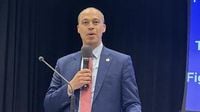Virginia’s political landscape was rocked this week as newly resurfaced text messages from 2022 revealed Democratic attorney general nominee Jay Jones expressing violent wishes toward a prominent Republican lawmaker and his family. The messages, first reported by National Review and later obtained by several major outlets, have ignited a firestorm just weeks ahead of the state’s closely watched November 4 elections.
Jay Jones, a former member of the Virginia House of Delegates and the recently nominated Democratic candidate for attorney general, found himself at the center of controversy after the publication of private texts sent to Republican Delegate Carrie Coyner. In the exchange, Jones compared then-House Speaker Todd Gilbert to infamous dictators Adolf Hitler and Pol Pot, writing, “Three people, two bullets. Gilbert, Hitler, and Pol Pot. Gilbert gets two bullets to the head.” He continued, “Spoiler: put Gilbert in the crew with the two worst people you know and he receives both bullets every time.”
Delegate Coyner, clearly disturbed by the tone of the messages, responded by urging Jones to stop. “Please stop,” she wrote. “It really bothers me when you talk about hurting people or wishing death on them. It isn’t ok. No matter who they are.” According to reporting from Straight Arrow News, Jones attempted to call Coyner after her reply, but instead doubled down, invoking Gilbert’s family in his rhetoric. A source familiar with the conversation told National Review that Jones argued the only way to shift Gilbert’s political views would be for him to witness personal tragedy. “Only when people feel pain personally do they move on policy,” Jones was quoted as saying. He added, referring to Gilbert and his wife, Jennifer, “I mean do I think Todd and Jennifer are evil? And that they’re breeding little fascists? Yes.”
The reaction was swift and severe from both sides of the aisle. Republican Governor Glenn Youngkin led the charge, publicly calling on Jones to withdraw from the race. “This violent, disgusting rhetoric targeted at an elected official and his children is beyond disqualifying,” Youngkin posted on X (formerly Twitter) on October 4. “There is no ‘gosh, I’m sorry’ here. Jones doesn’t have the morality or character to drop out of this race, and his running mates Abigail Spanberger, Ghazala Hashmi, and every elected Democrat in Virginia don’t have the courage to call on him to step away from this campaign in disgrace.”
Lieutenant Governor and gubernatorial candidate Winsome Earle-Sears echoed Youngkin’s sentiments, stating, “Jay Jones’ horrific comments are a symptom of the entire Democratic Party and his running mate, Abigail Spanberger, needs to call on him to drop out.” The Republican Association of Attorneys General also urged Jones to step aside, as did a chorus of state GOP figures.
Democratic leaders, while condemning the language used by Jones, stopped short of demanding his withdrawal. Abigail Spanberger, the Democratic candidate for governor, released a statement saying, “After learning of these comments earlier today, I spoke frankly with Jay about my disgust with what he had said and texted. I made clear to Jay that he must fully take responsibility for his words. What I have also made clear is that as a candidate—and as the next Governor of our Commonwealth, I will always condemn violent language in our politics.”
In a series of public apologies, Jones acknowledged the gravity of his words. In a statement to CNN, he said, “I take full responsibility for my actions, and I want to offer Speaker Gilbert and his family my deepest apologies. Reading these words again makes me nauseous. I am humbled, ashamed, and sorry.” He reiterated this remorse in interviews with local outlets WRIC-TV and ABC 8 News, stating, “I’m sick to my stomach when I read those words. Certainly they’re objectionable, they’re abhorrent, they have no place in Virginia, no place in this country’s discourse. Again, I am so deeply, deeply sorry.”
Despite the backlash, Jones announced his intention to remain in the race. “We’re gonna continue to move forward. This race has never been about me. It’s always been about the people of Virginia and what they deserve out of their leaders and their attorney general,” he told ABC 8 News.
Political observers are divided on the potential impact of the scandal. Alex Keena, a political science professor at Virginia Commonwealth University, noted to Straight Arrow News that Virginia’s off-year elections typically see low turnout, making outcomes unpredictable. “Because turnout is low, these races are very hard to predict,” Keena explained. “So on the one hand, this story could absolutely add volatility to the dynamics of the race. On the other hand, we live in a new era of American politics; public corruption is rampant and we no longer hold our elected officials to the high standards of integrity that we did a generation ago. In this way, this type of story may have no impact whatsoever on the race.”
Polls conducted before the release of the texts showed Jones leading incumbent Republican Attorney General Jason Miyares by about six percentage points—51% to 45%—with a margin of error of roughly 3.4 points. Early voting, which began on September 19, has already seen more than 284,000 ballots cast as of October 1, according to the Virginia Mercury. Analysts suggest that the controversy could energize conservative voters or sway moderates, though party loyalists may remain unmoved. As Keena put it, “That means that people who do show up, the voting population, tend to be party supporters and party loyalists—precisely the type of voter who is unlikely to be swayed.”
Notably, Jones’s Republican opponent, Jason Miyares, has not commented publicly on the controversy. Experts say the silence may be strategic, allowing the story to dominate headlines without further politicization from the GOP camp. Meanwhile, the Democratic Party has largely avoided direct calls for Jones’s withdrawal, a move some attribute to the realities of modern political loyalty and the risks of fracturing party unity so close to Election Day.
The episode has reignited debate over the boundaries of political rhetoric and the responsibility of public figures to set an example, especially in a climate where fears of political violence have been heightened by recent national events. Both parties have faced scrutiny in recent years for language that critics say can inflame tensions or normalize extremism. As the campaign enters its final stretch, the legal and ethical bounds of speech remain at the forefront of Virginia’s political conversation.
With early voting underway and Election Day approaching, Virginia voters are left to weigh not only the policy platforms of the candidates but also the character and judgment of those seeking to represent them. The outcome of the attorney general’s race may well hinge on whether the electorate sees Jones’s apologies as sufficient—or his words as unforgivable.


